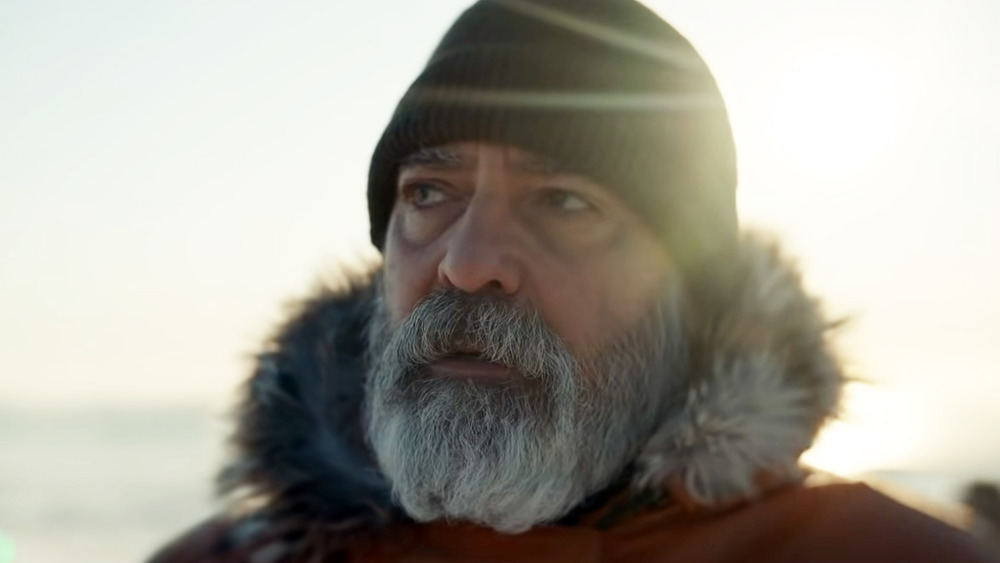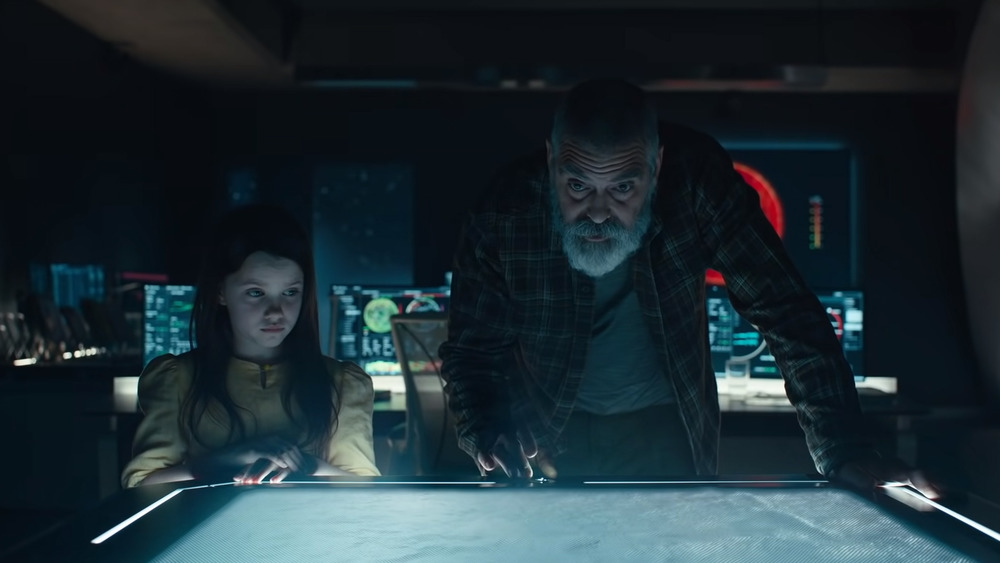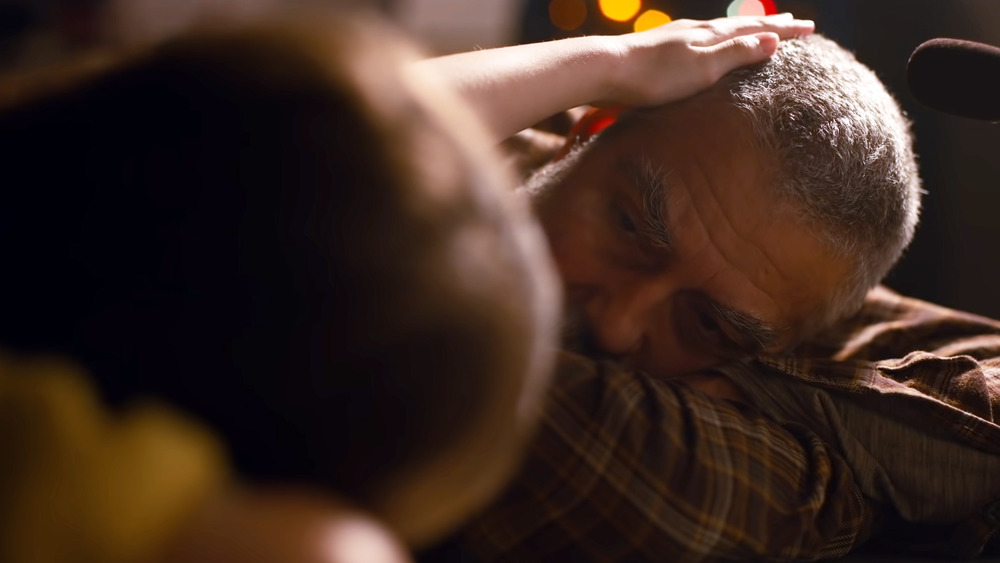The One Midnight Sky Scene That Makes Us Love George Clooney Even More
This content was paid for by Netflix and created by Looper.
Even for star and director George Clooney, The Midnight Sky is an unusual project. It's a sci-fi film that's more interested in people than science. It's an apocalyptic drama that never explains the cause of the apocalypse. There are plenty of action scenes, but its overall vibe is thoughtful and introspective, and despite being about the end of the world it's surprisingly full of hope.
As such, it's only fitting that one of Clooney's best scenes in The Midnight Sky is also one of its smallest. During their trek across Antarctica, Clooney's character, Augustine, and the small girl accompanying him, Iris, duck into a makeshift shelter for the night. Armed with a box of crayons, Iris begins drawing a picture of a woman — her mother, Augustine guesses. Augustine begins reminiscing about another woman he once knew, someone who was loud and funny and intensely smart. He asks Iris to share some details about her life. When the girl remains silent, he begs her to ask him a question. Much to Augustine's surprise, she does.
It's a minor scene, but The Midnight Sky's heart and soul lies in its quiet moments, and this brief conversation is key to understanding Augustine and his relationship with Iris. It's also a fantastic showcase for just how much George Clooney has grown as both an actor and a director. Clooney has made many excellent movies, but as this scene proves, The Midnight Sky may very well be his best yet.
Aging gracefully
If you only know George Clooney from his days as ER's resident heartthrob or his swaggering turn as heistmaster Danny Ocean, you may not recognize him when The Midnight Sky begins. In order to play Augustine, who's undergoing treatment for a terminal disease, Clooney lost 25 pounds. His famous face is hidden under a long, bushy beard. Unlike Clooney's most famous characters, Augustine isn't charming or funny. He's cantankerous, he rarely smiles, and he never laughs. In other words? In The Midnight Sky, Clooney looks old.
That's by design. After all, Clooney himself is pushing 60. As he tells Deadline, "It's where I'm headed. I can't stop it. If I could avoid it I'd like to look like I did in the Out of Sight years, but you can't stop the clock." And so, for The Midnight Sky, the actor embraced his age. Throughout The Midnight Sky, you can almost see the years weighing Augustine down.
Just listen to the way that Augustine wistfully describes the woman he once knew, and how fondly he recalls both her strengths and her flaws. These aren't the mutterings of a young man. They're the wistful remembrances of an older person who's recalling past days, when things were better. They're the words of someone who ended up alone, and who still wonders what could've been.
Augustine's monologue, however, is also tinged with wisdom. He knows that he can't change the past, and despite his regrets, has ultimately accepted his lot in life. You can see that kind of earned knowledge in Clooney's performance, and you can see it in his directing, too.
Compared to the madcap energy of Confessions of a Dangerous Mind or Good Night, and Good Luck's striking black-and-white cinematography, The Midnight Sky never calls attention to itself. This scene only has a couple of cuts. It's mostly just two people sitting across from each other, separated by the glow of a stray flashlight. It's confident without being showy, and is the kind of thing that only a director with age and experience can pull off. As we've seen, Clooney has plenty of both.
Understanding the power of silence
While many of Clooney's characters come equipped with flirty quips and perfectly-deployed one-liners, his strength as an actor comes largely from what he doesn't say. After all, his face communicates enough. Those cocky smirks and raised eyebrows add so much to movies like Out of Sight and Ocean's Eleven. Wide-eyed befuddlement and expertly timed double-takes sell the comedy in films like Intolerable Cruelty, O Brother, Where Art Thou?, and Hail, Caesar! The hard stares and loaded pauses in The Descendants, Syriana, and Gravity convey fear, sadness, and desperation. If you're paying attention, they'll tell you everything you need to know.
Of course, in The Midnight Sky, things are a little different. Clooney's scene partner, 7-year-old Caoilinn Springall, plays a character who usually doesn't talk at all, leaving Clooney as the one driving most of their interactions. Still, Augustine spends most of the movie talking around his real feelings. He never directly expresses real regret, or sadness, or loneliness, but his one-sided conversations with Iris, including this one, reveal plenty about the character to viewers who are willing to read between the lines.
The Midnight Sky's silence also gives Clooney another tool he can play with as a director, and he utilizes it very well. For most of its runtime, The Midnight Sky is a very quiet movie. As a result, when things get loud, it's very, very jarring. Clooney uses this to great effect during The Midnight Sky's action scenes, but he uses it even better here. When Iris finally speaks, asking Augustine, "Did you love her?," it's even more shocking than the smash cut to the disaster that follows, and goes a long way towards making this one of The Midnight Sky's most memorable scenes.
Keeping hope alive
Clooney's activism and philanthropic efforts are well-documented, and many of his directorial projects are politically charged, too. Good Night, and Good Luck chronicles the battle between journalist Edward R. Murrow and infamous anti-Communist crusader Joseph McCarthy. The Ides of March is a political drama documenting the inner workings of a Democratic primary campaign. Suburbicon explores race relations in the '50s. The Monuments Men, which tells the story of American soldiers who protect art and historical artifacts from destruction at the Nazis' hands, delves into a number of issues the UN and other organizations are still grappling with today.
The Midnight Sky was filmed before the COVID-19 outbreak began, so its eerily relevant exploration of isolation in the face of a global catastrophe is largely a coincidence. Still, one of the things that attracted Clooney to this story is its timeliness. "It's a story about trying to communicate and trying to be in touch with one another," Clooney tells The Hollywood Reporter. "When I read the script I thought, 'Well, this is an issue we have in general because of how polarized we are as a world and how we're having such trouble contacting one another.'"
This scene really gets to the heart of that concept. It is, fundamentally, a scene about two people trying to make contact. Augustine uses words. Iris uses pictures. The gap seems insurmountable. And yet, at the very end, Iris speaks. Yes, it's a shocking moment, but it's also a hopeful one. If these two strangers can find a way to communicate, why not everyone else? That's really The Midnight Sky's message, distilled into a single scene, and it's a perfect encapsulation of the ethos that drives Clooney's filmography: The world can be a better place. We just have to work hard to make it that way.


